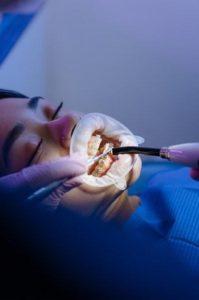Phone: 910-762-3481
IV sedation refers to the giving of an anti-anxiety medication through the blood during a treatment. Sometimes, intravenous sedation dentistry is called “sleep” or ‘twilight’ dentistry. Instead of putting patients to sleep, the mild sedative helps them feel at peace and relaxed. While this sedation method allows patients to react to the dental professional’s questions, they often have little to no recollection of the treatment when the sedation wears off. 
How does IV sedation work?
Before the dental procedure, your blood pressure is checked and your dentist will insert a thin needle into a vein on your arm or hand. The needle is attached to an IV tube that distributes the sedative into your bloodstream. While sedated, the dentist will observe your oxygen levels and pulse to ensure your body is responding well to the medication. After treatment, your blood pressure is checked once again, and you may feel a bit groggy. For that reason, it is important to have a friend or family member drive you home. It also is recommended that you take an entire day off from school or work to ensure you get enough rest as you allow the effects of sedation to wear off.
Benefits of IV sedation dentistry
Intravenous sedation dentistry can be beneficial for many patients who fear “the chair”. Here’s a look at reasons why:
Questions to ask about your dental treatment recommendations
If you’re in need of oral treatment and choosing Phelps Family Dentistry, you can rest assured we’re here to help ease any anxiety you may have. We encourage you to speak with the dentist about sedation. Here are some questions you may want to discuss:
Which kind of sedation is right for my situation?
When it comes to sedation, there’s not a one-size-fits-all solution for every patient. Asking your oral surgeon or dentist about the types of sedation they offer will help you make a choice.
Is sedation right for me?
During the consultation, the team at Phelp Family Dentistry helps you assess all of your available solutions for sedation.We take into consideration your health, age, the cause of your anxiety (i.e. past trauma, childhood fears), particular concerns you have about the treatment, physical discomforts, possible drug interactions and all other things you might have in mind.
Are there any risks or side effects?
Today’s dental sedation techniques are more effective and safer than a decade ago. However, it is still important to understand the potential side effects. We’ll discuss these during your consultation.
If you have any other questions regarding your treatment recommendations or sedation methods our Wilmington dentists offer, please don’t hesitate to contact us.